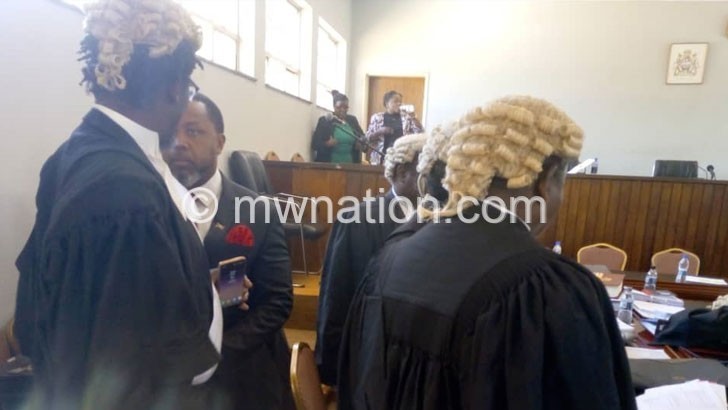Chilima faces setback in polls case
As the historic elections case continued with first petitioner Saulos Chilima taking to the witness stand for re-examination in the Constitutional Court yesterday, his team faced hurdles following successful objections by the respondents on key areas.
When one of Chilima’s lawyers Chikosa Silungwe started asking his client percentages on a number of things relating to irregularities emanating from cross-examination by Attorney General (AG) Kalekeni Kaphale, the AG objected.

In opposing the question, Kaphale argued that when they were calculating the percentages together in cross-examination, he did not ask Chilima anything in relation to his sworn statements his (Chilima’s) witnesses, Darlington Ndasauka and Miriam Gwalidi.
But Silungwe argued the AG and lawyers representing President Peter Mutharika, Frank Mbeta and Charles Mhango, asked if the irregularities had affected results.
However, Kaphale reminded the court that his question on whether the irregularities had affected results was rejected, adding he kept reminding the court that such objections would affect Chilima’s legal team in re-examination.
Before the objection matter was resolved, Silungwe also informed the court at the beginning of the re-examination that he would use a document titled First Petitioner’s Analysis on Attorney General.
Immediately after the AG raised his first objection, Mbeta also rose to reject the use of that document, arguing when cross-examination was being done, the document did not exist.
“This document seeks to bring a different dimension. What we cross-examined is on court record and re-examination should be based on that.
“The first petitioner should not be allowed to bring new stuff in the name of working document through the backdoor,” Mbeta argued.
But Silungwe argued the respondents presented one side of the story and the court needed to allow the petitioners to present their side.
After lengthy arguments, chair of the five-judge panel, Healey Potani said the court could not underestimate the importance of re-examination, which is done to realign one’s case, whereas cross-examination is aimed at destroying one’s evidence.
He agreed with Kaphale that he did not deal with sworn statements of Ndasauka and Gwalidi on percentages in cross-examination and he had indicated to deal with that when the two witnesses came.
The court upheld the objection.
Potani further stopped Silungwe from using the documents he had brought to court, stating that the document provided answers to the witness, which he said is unacceptable.
The court ordered Chilima’s legal team to rework the document and disregard certain areas.
Silungwe then moved on with re-examination of his client, highlighting areas of irregularities.
Reference to altered documents were made and how other null and void votes were mishandled.
Addressing the court in the morning, Potani said the view of the Constitutional Court was that the Malawi Electoral Commission (MEC)—which Kaphale is representing—should desist from acting in a manner that will suggest that it was colluding with lawyers for the Democratic Progressive Party (DPP) presidential candidate Peter Mutharika.
This followed an observation by some legal minds that by representing MEC, Kaphale was in conflict of interest.
Said Potani: “Another aspect, the overall scheme of these proceedings, the proceedings emanate from the electoral case in which the first, second petitioner, the first respondent took part and the second respondent is a referee. Our position is that the conduct of the second respondent in these proceedings should reflect that position as a neutral arbitrator in these matters notwithstanding that there is some common interest between the first and second respondent.”
He further called on the parties to continuously keep in mind that witnesses should not be asked to provide legal opinions.
He said that cross-examination should be limited to matters in dispute, urging the parties to utilise the newly filed list of matters that are in dispute and those not in dispute.
“Where the issue is about summarisation of figures, we feel there is no point to belabour this in cross-examination because the court has been provided with calculators and will do the calculations. If the parties feel strong to prepare figures,” said Potani.
But commenting on his role, Kaphale insisted that the directions of the court did not mean that the court had agreed that the AG or MEC had conducted themselves in a manner suggesting collusion with DPP’s legal team but that the court was reminding MEC of the principles guiding the impartiality of MEC.
“How am I compromised? Nobody gave any evidence of me being compromised. In all legal matters, where you have two people one side of the case, and those two people have not sued each other, they are likely to take the same position. There are areas of agreement that have arisen as common agreement, it’s very difficult to draw a clear line. Of course, the observation that Electoral Commission is in very unique position, but we have compiled our case on our own,” he said.
Chilima re-examination is expected to continue when the case continues today.
The petitioners contend that Mutharika, the first respondent, “won a fraudulent election” fraught with irregularities, including use of correction fluid to alter result sheets.





